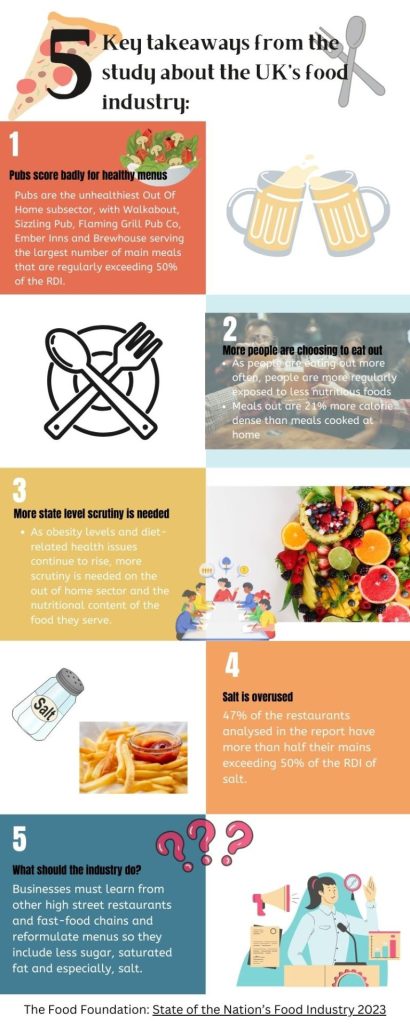London pub chains have been found to have some of the unhealthiest menus when rated for their levels of salt, saturated fat, and calories, according to a report looking at the state of the food industry across the UK.
Tank and Paddle and Brewhouse and Kitchen scored among the worst in a new report by charity The Food Foundation for offering main meals which exceed 50% of the Recommended Daily Intake (RDI) amounts.
The November 2023 report titled The State of the Nation’s Food Industry looks at major food retailers and Out of Home food outlets, defined as restaurants, cafes, takeaways, across the UK and assesses what changes, if any, they are making towards healthier and more sustainable food offerings.
The report uses ten metrics, one of which is the ‘healthy menu’ metric which assesses the nutritional quality of main meals
It showed that the London chains scored poorly in its analysis of 84 major casual dining restaurants and cafes.
Restaurants were chosen either because they had 250 employees or more in 2020, or fell within the top 100 in terms of sales from a 2013 list, the report says.
Pub chain Tank and Paddle, which has two east London outlets in Bishopsgate and Minster Court, ranked first for highest saturated fat, calories and salt in its meals.
Meals offered by the pub include stone-baked pizza ‘sharers’ and a variety of mac and cheeses. All of the pizza flavours, which cost around £14, have over 1,000 calories (excluding the margarita).
Tank and Paddle ranked number one in the report for the highest proportion of main mean offerings which exceed 50% of RDI for saturated fat (80%), calories (51%) and salt (94%), which is shown in Table 1.
Another pub chain with three London outlets, Brewhouse and Kitchen, which has venues in Highbury, Hoxton and Islington also scored badly on healthy menu options.
Some of its main meals include steak and ale pie, pork belly rib and ‘Beer can chicken’ served with hop and herb salted fries and seasoned corn ribs.
The report ranks Brewhouse and Kitchen at number four for saturated fat levels in its main meals with 57% of them containing over the RDI, behind Greene King pub chain (58%) and Gourmet Burger King (70%).
Neither Tank and Paddle nor Brewhouse and Kitchen responded to inquiries about their menus from South West Londoner.
Chloe MacKean, Business Engagement Manager at The Food Foundation – which aims to improve food policy and business practices – told South West Londoner that they had identified a growing need to look further into the practices of the ‘Out of Home’ sector.
She said: “The healthy menus metric looks at how healthy some of the meals that restaurants are serving up are… and tries to bring together a holistic picture of what businesses are doing around helping people to have a healthy and sustainable diet.”
The report includes ethical recommendations for businesses to adopt to help fix the “broken food system”. It analyses the affordability and accessibility of food, business transparency, the role of advertising, and food delivery apps.

MacKean emphasised that there must be government policy change before all businesses can be put on a path to better help consumers make informed choices, noting that commercial interests can drive decision making away from reducing salt or sugar levels in meals.
She said: “We need more transparency within the food industry so that people can see and make choices themselves as well.”
She cites the recent example of a government policy shift which saw restaurants, cafes and takeaways with over 250 employees display calories on menus, introduced by the government in 2022 to reduce obesity rates among the population.
McKean said: “The calorie table [in the report] has much lower percentages, and now we do have calories on menus – so that shows where government policy is actually helping to improve the healthiness of a meal.”
However, there remains a major barrier for food businesses to improve menu offerings.
She said: “The main overarching issue for the whole of the food sector is there is still not an agreed way of defining what healthy food is.”
The Food Foundation believes that restaurants have a responsibility to support customers in making healthier eating choices, particularly considering the country’s rising diet-related health problems, like obesity and type 2 diabetes.
Obesity rates have been rising over the past few decades; since 1993, the proportion of adults in England who are overweight or obese has increased from 52.9% to 64.3%, according to NHS data.
Featured image: Dan Barrett on Unsplash





